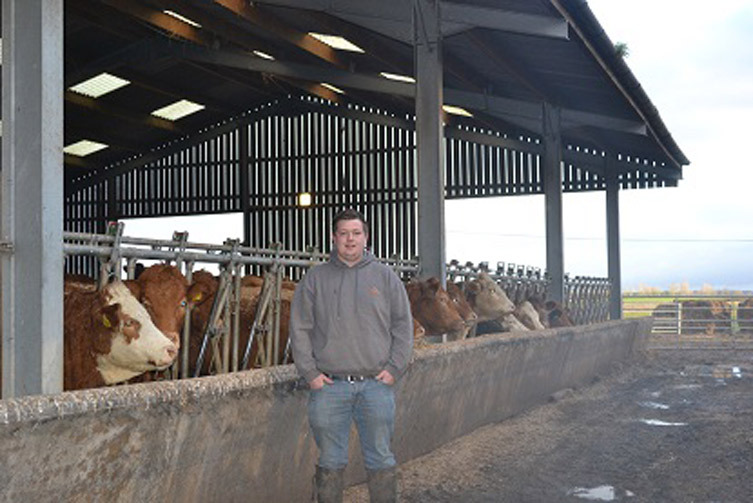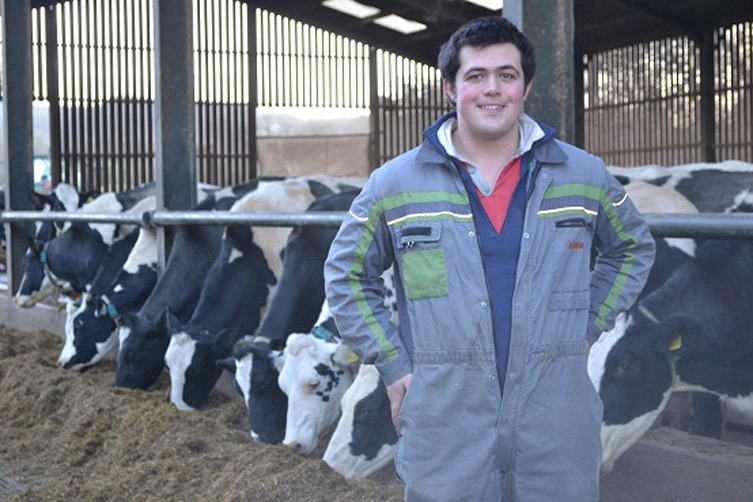Alex Heath from Market Drayton and Rob Higgins from Shrewsbury have a lot in common. They are both from Shropshire, are involved with their family farming businesses and share a common view of the importance on embracing genetics and breeding technologies to help strengthen the business. In Rob's case this is the 190 cow pedigree Holstein herd while for Alex it is a herd of pedigree Simmentals and Limousins.
They were also both given the opportunity to gain a detailed insight into the work of a breeding company when they spent time with Cogent as finalists in the Beef Futures and Dairy Futures competitions run by the company.
"The pace of development in genetics and breeding technologies is opening a vast range of opportunities to further improve efficiency in dairy and beef production," comments Andrew Holliday, Dairy Product Manager (EMEA) with Cogent. "It is becoming increasingly important that farmers understand how to apply these technologies to underpin business development and profitability in both the beef and dairy sectors.
"More beef producers understand the commercial value of high index sires in delivering accelerated growth rates and superior carcase grades to generate higher margins while dairy farmers appreciate how technologies can help improve reproductive performance and the quality of cows in the herd.
"The Cogent Futures Programmes allow young beef and dairy farmers to gain a unique insight into developments in genetics and breeding technologies and their place in developing profitable systems. Finalists experience a range of farming practices and meet key people from across the industry with varied approaches to beef and dairy production as well as spending time with in house experts."
Building a strong foundation Alex Heath
21 year old Alex Heath is convinced a commitment to quality genetics is essential for the continued development of a successful beef enterprise at the family farm which is also home to a 68,000 free range layer unit.
The beef herd is made up of 50 pedigree Simmentals and 20 pedigree Limousins and breeding technologies are a key part of the management of the herd.
"We have been using AI for several years as a way to increase the genetic merit of the herd," Alex explains. "We want to build up a herd of modern Simmentals, with strong maternal traits, fine bone, width through the back end and plenty of shape, which is what the market is demanding at the moment.
"AI allows us access to a far greater pool of genetics so we can target specific traits. We are using AI on the Limousins to increase the overall merit of that part of the herd. It is used on some of the Simmentals to get outcross lines."
The family have also started using embryo transfer with three cows flushed per year. They now have three excellent daughters from their successful show cow by the leading sire Banwy Wonderboy.
"Showing is a key part of the business, providing a shop window for the sale of livestock and embryos. Increasing the influence of our best cows is a key aim for us but you mustn't lose track of the main objectives of beef production.
"We want to breed efficient and profitable cattle, that will serve other people well, while producing killing cattle to hit market specifications with excellent growth rates and feed conversion. "The foundations of our business are rearing top quality cattle from minimal concentrate inputs, utilising the milking ability of the dam whilst ensuring high growth rates and meat yields.
"Genetics are at the centre of achieving this. Embryo transfer allows us to target the best female lines to breed from, complementing them with AI from bulls with strong terminal traits. As an industry, the beef sector will need to determine how best to exploit the full potential of genetics to build its competitive position."

Technologies drive herd quality Rob Higgins
Rob Higgins farms with his family at Bentley Ford Farm, Shrewsbury where they currently milk a herd of 190 all year round calving pedigree Holsteins, averaging 8800 litres.
The herd was graded up to pedigree in 2015 and Rob explains that since then breeding technologies have played a significant role in further developing the herd.
"While we have purchased a few select females, we want to develop the herd from our own resources and genetic technologies are central to this," he comments. "Sire selection has been 100% genomic sires. We use sexed semen on all our heifers. These approaches should accelerate the rate of genetic progress and this year we will start Genomic testing females to identify those with the best genetic merit. These new technologies have the potential to improve the productive capability of the UK herd and should be grasped by all farmers.
"Having grown up with quality stock I've always felt if you are going to keep stock and work with them every day you might as well have quality. So the aim is to breed the best herd that I can and furthermore, when selling stock quality will always sell."
Looking forward, Rob has big ideas for the dairy farm with plans for his own herd focussed on utilising the latest technologies and genetics to improve the productivity and efficiency of the herd and develop female lines to hopefully breed AI sires in the future.
"I'm particularly interested in how data can be used to drive efficiencies," says Rob. "Technology such as mating programmes will allow us to selectively breed our animals. Coupled with female genomic testing and the use of sexed semen we can identify the top cows to produce the next generation of our herd, creating an opportunity to breed the lower end to beef thus driving efficiencies.
"Looking forward we hope to increase both herd size and yield per cow while breeding a long-lasting and productive cow. It will be essential to do this if increased production is to be cost-efficient and we are to be profitable in the current and future volatile global market place.
"Hopefully one day we will also see a Bentleyford bull in an AI stud."
